No stranger to unexpected challenges, House of Yes is ready for post-pandemic reinvention. But what does that future look like?
House of Yes has been a tour de force in Brooklyn for a number of years, and it took on many different forms over that time. Despite its different forms and changing locations, founders Kae Burke and Anya Sapozhnikova have always remained true to one core mission, “bringing people together.”
While there were many trials and tribulations over the years, including the loss of the original location to a fire, these setbacks didn’t stop them from pursuing their mission. Instead, each curveball and each obstacle taught them lessons in, not just how to survive, but how to thrive. Now with the pandemic forcing everyone to rethink, well, everything, House of Yes is well prepared, having had to rethink everything a number of times before.
There are so many things about House of Yes that set it apart from other nightclubs, but what newbies notice first is the stunning visual spectacle. No matter what party theme (and there are so many diverse themes) not only is the production going to be visual but the audience as well. Patrons are highly costumed and things like gender and race naturally melt away as a result. I’ve personally joked that House of Yes is like Studio 54 (in terms of energy and inclusiveness inside) without the velvet rope (meaning there is no exclusivity to who gets in).
Regardless of intention, success, or community, everything art-related has taken quite a hit during the pandemic and House of Yes was no exception. Then Anya found herself in a troubling mental state, so troubling that she eventually checked in to a mental hospital for a 30-day inpatient program. And in true House of Yes style, she later held an AMA on Zoom to talk openly about her struggles.
Looking to gain some more insight into the future of House of Yes, we jumped at the chance to chat with them about the future and more. And after talking with them one thing is clear – House of Yes isn’t going anywhere and will find a way to thrive in our post-pandemic normal. So check out their recently produced video “Humans” below and read on for the conversation.
Hello Kae and Anya, we’re excited to talk to you today! Before we get into the current state of affairs, can you give our readers some insight into the origins of House of Yes?
Anya: It started as a house party in a loft with us and our friends. It was never meant to be, well, not never, but it was not a decision to start a business. It was a decision to have a good time with our friends! Only when it burned down did we realize that what we were doing was important, not just to us and our friends, but also to the community at large. So House of Yes was really born out of the fire into becoming a community space, and then suddenly we’re running an art space. It was very ambiguous, amorphous, and unintentional before.
Since the fire, it’s been getting more and more intentional. The second one was kind of like, what is this? And how do we steer the ship? We were just getting our footing and learning how to actually be operators and professionally, doing the thing that we’ve been doing. What’s happening now, with the pandemic, and with the transformations that we’re all undergoing, there’s going to be this whole other new chapter that will happen post-pandemic.
House of Yes has taken different shapes and been housed in different locations over the years. The current location feels like home for a number of reasons. Is that true to you or is this just a recency bias?
Kae: The current venue, of course, has home vibes. But we’ve realized that home is literally where the heart is and that we are not confined to a building. We’re not confined to four walls at all. We’re not even confined to New York City. So when you think about it, we’re based in New York, and New York is where we come from. But now we have family and other homes in other places and other cities. In 2019, we had a home in Times Square and that taught us that House of Yes is bigger. We can think outside the city and outside the venue. Now in 2021, we’re thinking outside the physical space and physical gatherings.
Your mission is clearly focused on the artistic and creative aspects of nightlife culture which means that free expression is a natural fit. However, this is precisely where some venues fail to support their patrons. What makes House of Yes so uniquely inclusive and supportive for patrons of all kinds?
A: What we keep coming back to over and over again is that the art that we make, and the programming that we create, and just about any product that House of Yes makes, it’s not the final thing, which is actually just bringing people together. It’s like an art gallery that exists for the sake of the art. For us, art is a tool we use to bring people together. So the actual purpose is to bring people together. The better the art and more fun it is to participate in it, the better it’s going to accomplish this goal of bringing people together.
K: Our approach and our process of how we create these experiences, that’s what sets us apart. I honestly think if you want to compare us to other venues or other groups of our kind, I think the difference is we came from a visual arts and performance background, as opposed to, let’s say, a DJ who opened up a nightclub. Very different kinds of nightclubs as far as where it comes from – and we just stay true to that. That’s our approach and, as Anya said, we just keep focusing on it. I think other venues could do really cool stuff if they made it a priority and put a lot of time and resources into it.
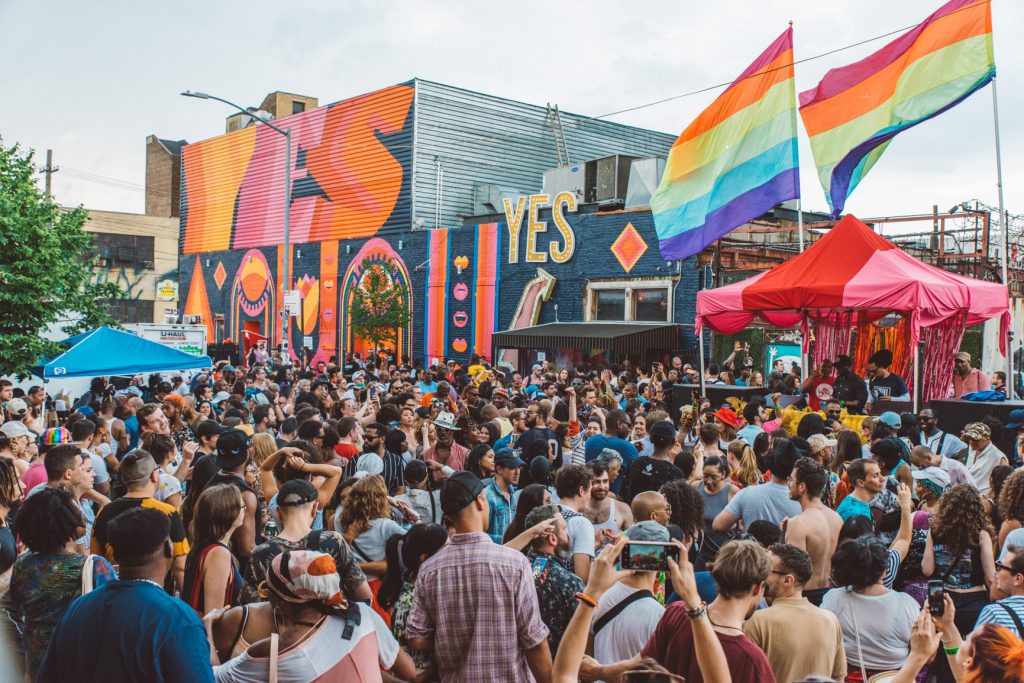
As shutdowns happened you took to livestreaming and had early success layering on Zoom dance parties. But Zoom fatigue doesn’t just impact business meetings, it applies to parties, too. You very mindfully culled your programming and kept seeking new ideas. What has the past year taught you about programming and how will you apply this as live events slowly return?
K: I would say it’s adaptability. Innovation comes from adaptability in the moment. So you’re responding to your audience and your own passion. We experiment, we try it, we see if people like it. So when we were doing the digital dance parties it was great. When we saw ourselves becoming less passionate, and the audience was also feeling Zoom fatigue we responded to that in real-time.
A: We’re constantly responding to like things in the news, and social-cultural movements, and fashion so we’re very responsive to what is happening around us right now. And Zoom was the only thing happening around this moment. So we embraced it and took it as far as it could go.
K: And the next thing. There’ll be some new next thing that captures our passion that we’ll experiment with, too.
House of Yes was prominently featured in the recent Glittberbox documentary “Where Love Lives.” The storyline of marginalized performers finding unconditional love in nightlife is an important one for us all to remember, especially if we’re in a privileged class. How do you see yourselves helping to strengthen that story and give a voice to those that were previously silenced?
K: Listen, learn, amplify, repeat. Do that in perpetuity. Especially as privileged class people it is our responsibility to listen, learn, and amplify voices. Like booking a performer that couldn’t afford dance classes, but they have that special spark. Give them a fucking chance! Not everyone could go to fancy dance school. Performers may not have 100,000 Instagram followers like House of Yes, but maybe their voice is so true to the moment – how can we help support their voice so it’s seen and heard?
A: We recognize that, as a nightlife establishment, we are by default culture-makers and culture shifters. What we present, especially since we’re such a visually stunning brand [Both Laugh] has an impact. Making sure you have diverse casting, making sure you have women behind the decks, making sure you have all expressions of gender represented, that we are on top of the immediate push in the right direction. We’re also influencing people around us even though sometimes it’s easy to forget that.
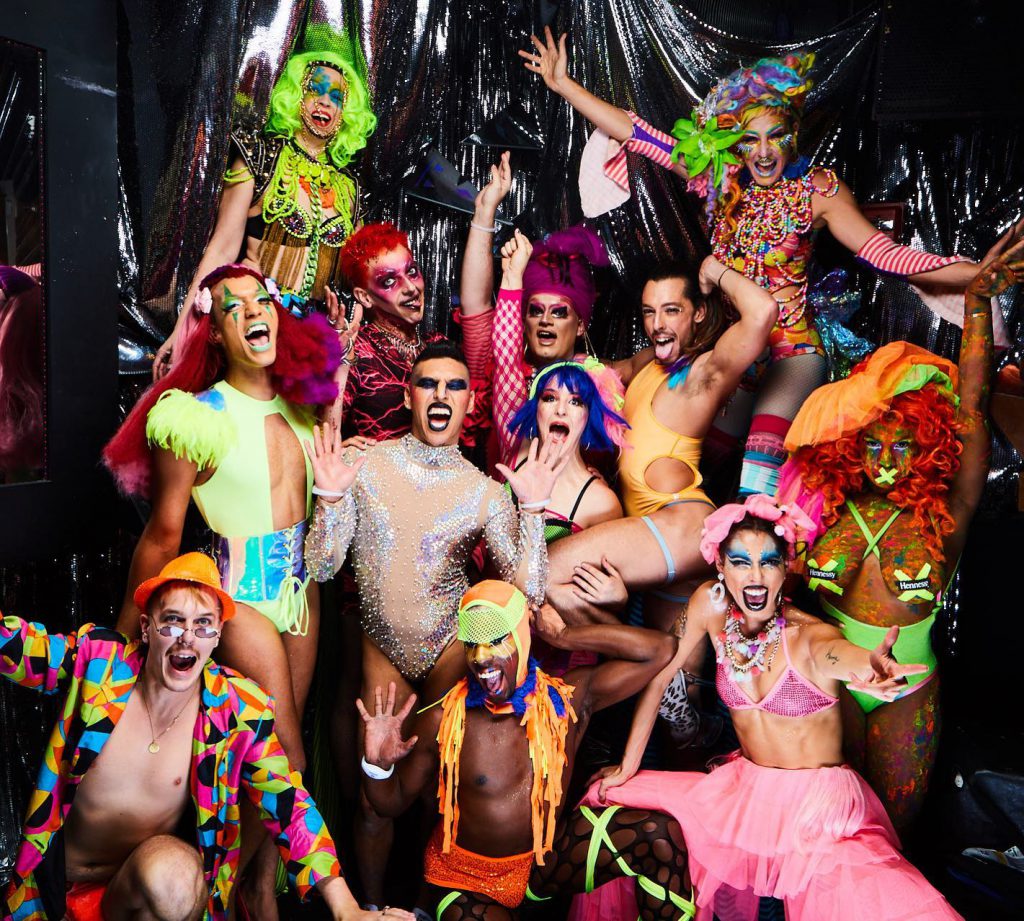
Anya, you checked yourself into a mental hospital back in November and, wait, is mental hospital even the proper term these days?
A: When I got back home, a friend had something that I made in her closet and I said, “You stole my outfit!” She’s like, “No, I borrowed it when you were in the loony bin!”
K: What?!?
A: It was really funny. I was like, yeah, we should refer to it as a loony bin because it should be destigmatized. But I don’t want to make it weird.
K: Make it weird!
I’m with you, let’s make it weird! After your month in the “loony bin” you hosted an AMA about your experience. It was so powerful to hear you tell your story and to see so many from the House of Yes family participate in the discussion. More people need to tell their stories to help destigmatize mental health issues. Do you think the time is right for more public discourse?
A: Absolutely. It’s been time for more public discourse for a very long time. Just like with many things in the pandemic, everything that was already fucked up reached a breaking point. Now it’s really obvious. Sometimes it just takes 10% more of being sick to have it be obvious to the people around you. The pandemic definitely pushed people over that edge and now we see it, but it’s always been an issue. Now that it’s a crisis more so than before I think we should make mental health a pop culture thing that people focus on.
A big takeaway was when you paralleled running a nightclub and a hospital. You went on to challenge why we have art therapy programs and clinical programs for mental health, but no overlap between the two. I think you are really on to something here! What are your plans to push that mission? Do you see House of Yes playing a direct role?
A: Like everything else at House of Yes it’s driven by people’s personal passions. I saw so clearly how to fix it. Repairing mental health in the United States is a very big and complicated issue. The way that I’m approaching it now is the same way that everything else has worked. I’m starting it really small and from a grassroots level until we know what we’re doing.
I started this group called Love Club and I’ve accumulated close to 200 people now. I’ve been consulting with the mental health practitioners on that list to start. We’re not going to solve the health insurance problem, we’re not going to solve the lack of finding a psychiatrist. But group therapy is a really, really powerful thing. It worked in the very fancy mental hospital that I was at and you see with the rise of men’s groups.
I think providing people with a container to lean on each other in a structured way is a great start. It’s gonna be a free group where join on Zoom and then based on how many people are there and how many facilitators there are, we split off into groups. That’ll be our entryway into it. Very grassroots. We’re not giving clinical advice, we’re not diagnosing, but it’s a community support group.
House of Yes does a number of things that patrons may never see to make nightlife safer for everyone. Your security is compassionate and seeking individual safety above all else. You have a full time medical professional able to handle many situations safely on site. And perhaps most visible is the Concenticorn program of safety monitors. Why do you think it’s so rare for nightclubs to be structured this way?
K: Because it’s expensive. If you think about it finding and recruiting the right people for the right role, who are compassionate, and then supporting their compassionate processes – it’s a lot of time and effort. And then paying those people for their time. It’s expensive! I think that’s a simple answer as to why a lot of venues just don’t do it. Some are not as lucky and maybe it wouldn’t even be an option for them, and then some choose to not focus on it.
Do you think that the time and capital you’ve put into it has driven part of your success?
A: Absolutely. I think that it’s all of the non-quantifiable things that make House of Yes successful. We didn’t even make any money for the first seven or eight years. It’s wasn’t about money. It’s about money now, but that’s because we want to do bigger and more elaborate stuff. We have more people and we’re hiring a lot of people. So it does require a lot of money, but it was never really a money thing.
K: Yes, and we also operate by the adage “be the change you want to see.” And our interpretation should be the nightclub you want to go to. We worked in nightlife and nightclubs all over the city for 10 years before this, the grab-y-est, most bottle service-y ones ever. We were grabbed everywhere, in every borough, every weekend. And it was up to you to defend yourself. The security guards didn’t give a fuck. The point being, it was so necessary that we created a nightclub that our people would want to go to and would have fun at.
And then here’s the thing – our audience is super vocal with us. If somebody is having a negative experience, or they notice something, we encourage our audience to let us know. We take it pretty seriously as you can see with the Consenticorns and some of the practices that we put into place. These were actually from our audience saying they noticed the crowd getting a little rougher and things like that. We sit around for hours discussing solutions for, not just one person, but our community at large. So I guess the point is that we listen.
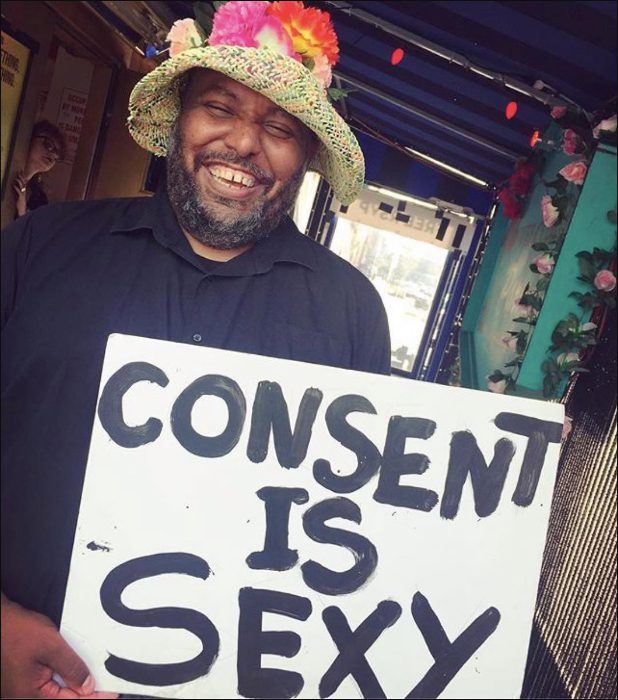
The last year created so many unique challenges for venues like yours. Add in the health of the staff, Anya’s experience, and the unknown of our post pandemic “new normal”. How do you see House of Yes reimagining itself in 2021 and beyond?
K: Outdoors! Like we were saying earlier, we can do parties anywhere, we can do theater shows anywhere, we could do experiences anywhere. So right now we’re looking at other places, we’ve applied for some block parties, those are still quite restricted. We’re looking at some outdoor summertime in New York ideas. We’re looking at some places and other cities, too.
A: We’re talking to developers who have a parking lot that is interested in putting something there and everyone is so open-minded right now. Because no one has a plan, no one has ever done this before. There is this energy and excitement and the city coming back to life. And we’re all responsible for making it a really amazing summer. So it’s very wide open as to what can happen.
This was an important, but sometimes heavy discussion – let’s end on a lighter note. Aside from reopening House of Yes and performing your art once again, what are you most looking forward to getting back to in a post pandemic world?
K: I’m really excited about interactive performance art. My art, personally, is character development, so I’m excited to not only do that for myself but to have more people doing more role-playing characters. More roaming entertainment experiences, that are meant to be weird interactions that bring people together. I’m excited to do that – just create weird characters!
A: I think that originally when we all started with House of Yes, there was this raw, no regard for society as a whole, or capitalism. It was pure art creativity and fun. It was this really pure energy! Through the years, as you get older, you start to need the comforts of being an adult. We get absorbed in the capitalistic world and not focused on the things that are actually really, really important. I think coming back, we’ve gotten back into “what is real?”
I saw that personified this weekend when I went to Knickerbocker market and they had a show in the street. It was this energy of art for art’s sake. People screaming at cars and getting naked on the street and running after people trying to walk their dog. It was just like total chaos and total cacophony. And I think that is something that’s been missing. Nightlife has gotten a little bit too polished, a little bit too slick. I think this like grimy, pure fun, crazy energy is gonna be a thing that will be back in a big way. I’m really excited to douse myself in it!
Being faced with mortality in such a huge way. Death has been at the forefront of everything for the past fucking year. And I think when you really confront your mortality, that’s when you stop giving a fuck about getting wrinkles and you stop giving a fuck about things that aren’t important. Nightlife is such amplification of whatever’s happening. Being in the thick of it, in the thick of the thick when everything comes back, I think it’s gonna be really special.
K: I miss the feel of the audience. It’s more than a sound or visual. There’s this feeling whether it’s an audience laughing or clapping at a House of Yes, a circus show, or just like the feeling of the mass of people, when they’re all in the same room, just dancing to the same thing. It’s like, it’s gold. Pure gold. There’s nothing like it and that’s something we can’t do ourselves. So we need all the people all the time to just be in it together.



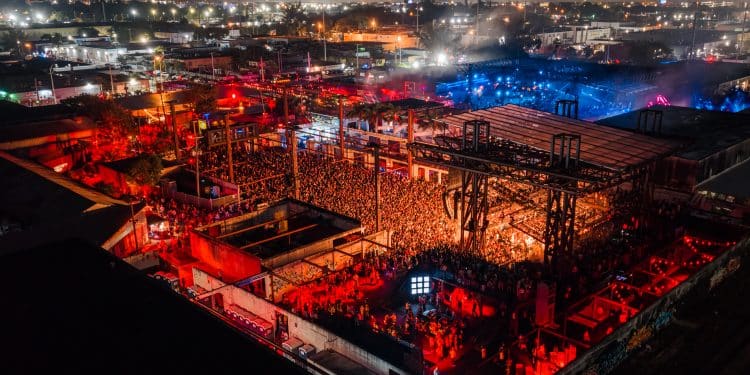




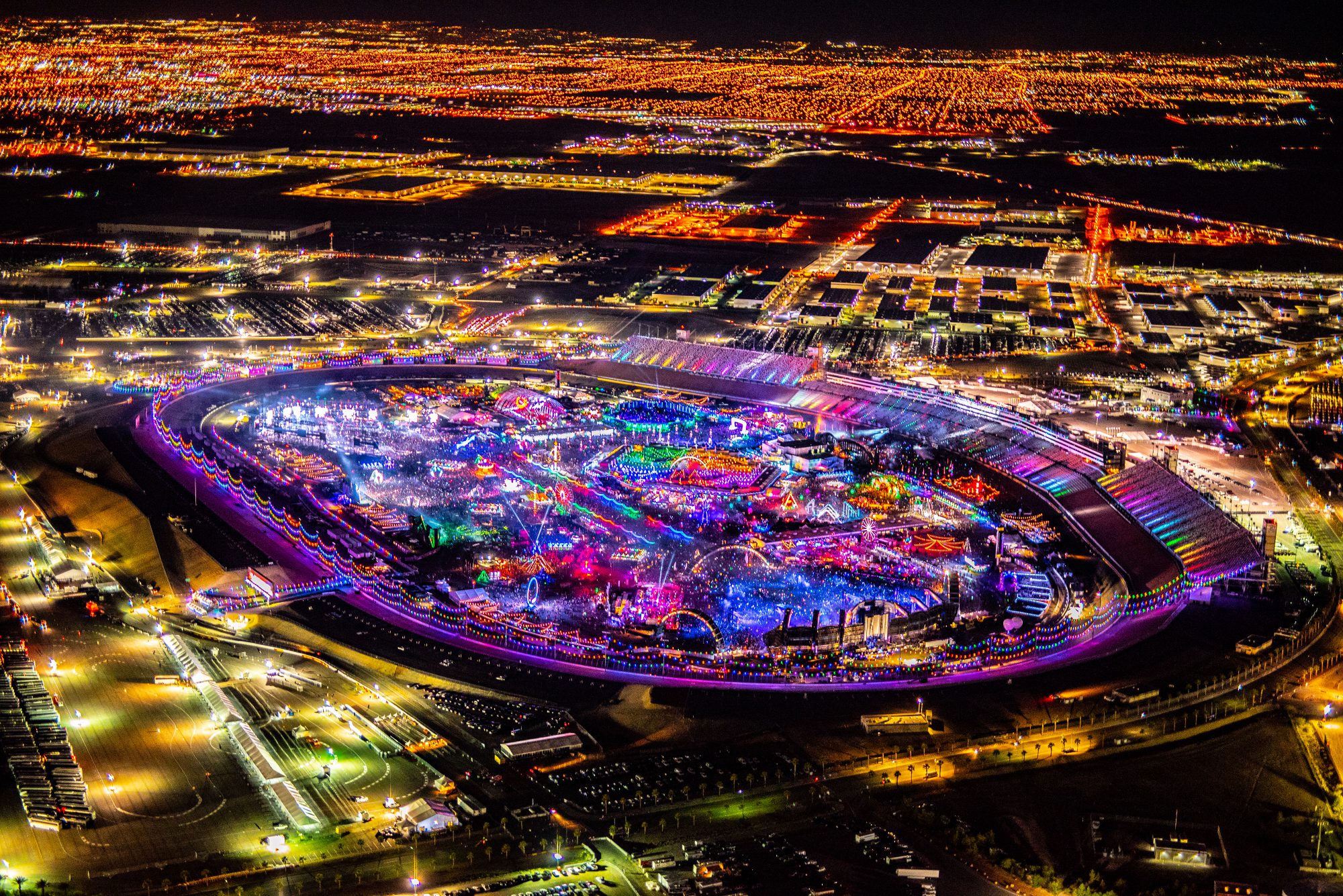
Such a great and thorough read! I’ve always wanted to learn more about House of Yes! <3